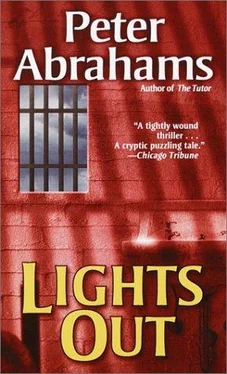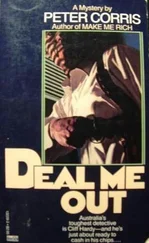Peter Abrahams - Lights Out
Здесь есть возможность читать онлайн «Peter Abrahams - Lights Out» весь текст электронной книги совершенно бесплатно (целиком полную версию без сокращений). В некоторых случаях можно слушать аудио, скачать через торрент в формате fb2 и присутствует краткое содержание. Год выпуска: 2002, ISBN: 2002, Издательство: Fawcett Books, Жанр: Триллер, на английском языке. Описание произведения, (предисловие) а так же отзывы посетителей доступны на портале библиотеки ЛибКат.
- Название:Lights Out
- Автор:
- Издательство:Fawcett Books
- Жанр:
- Год:2002
- ISBN:978-0345445780
- Рейтинг книги:4 / 5. Голосов: 1
-
Избранное:Добавить в избранное
- Отзывы:
-
Ваша оценка:
- 80
- 1
- 2
- 3
- 4
- 5
Lights Out: краткое содержание, описание и аннотация
Предлагаем к чтению аннотацию, описание, краткое содержание или предисловие (зависит от того, что написал сам автор книги «Lights Out»). Если вы не нашли необходимую информацию о книге — напишите в комментариях, мы постараемся отыскать её.
Lights Out — читать онлайн бесплатно полную книгу (весь текст) целиком
Ниже представлен текст книги, разбитый по страницам. Система сохранения места последней прочитанной страницы, позволяет с удобством читать онлайн бесплатно книгу «Lights Out», без необходимости каждый раз заново искать на чём Вы остановились. Поставьте закладку, и сможете в любой момент перейти на страницу, на которой закончили чтение.
Интервал:
Закладка:
The boy nodded.
Didn’t that make the whole question of why the mariner did it irrelevant? There had to be more to the story than that. The boy was smart, much smarter than he was, but Eddie wasn’t buying his explanation. He gazed out the dusty window, closing in on the thought that would show the boy he was wrong. Outside two men went by in a hurry. One was Eddie’s employer in the tuxedo. The other was Senor Paz.
Eddie went to the window, looked down the sidewalk. The two men turned onto a busy street at the end of the block and disappeared in the crowd. For a moment Eddie had the crazy thought that they were looking for him. He’d drunk all that champagne, eaten caviar, and hadn’t paid a bill. But there hadn’t been a bill, had there? It was all on the house. Eddie relaxed.
The boy was sitting at the desk, tapping at the computer keyboard. After a few moments, the printer whined on, un-scrolled two or three pages. The boy tore them off, handed them to Eddie.
It was a list of reference books on “The Mariner.” “These might help,” the boy said. “They’re all in the library.”
Eddie took the list, looked down at the boy. He had hollow cheeks, pimples, a wispy mustache, didn’t even seem healthy. Eddie liked him more than anyone he’d met in a long time.
“How come you’re not in school?” Eddie said.
All the talk had relaxed the boy. He blurted, “Are you the truant officer?”
Eddie laughed. “Do I look like a truant officer?”
The boy started to answer, stopped himself.
“Go on,” Eddie said.
The boy licked his lips. “You look like a hit man.”
“A step up from the truant officer,” Eddie said. But he stopped laughing.
The boy saw that and quickly gave the straight answer. “No school today. It’s a holiday.”
“It is?”
“Purim,” the boy said.
“I don’t know that one,” Eddie said.
“Esther saving her people,” the boy said. “We bake these to celebrate.” He picked up a bowl containing three-cornered pastries and offered one to Eddie.
Dry, and tasting of poppy seeds: not nearly as good as Ram’s Holesome Trail Mix. Eddie ate it; he didn’t want to hurt the boy’s feelings. He was a smart boy, good with books; good at finding information.
“I’m looking for someone,” Eddie said.
“To bump off? Sorry.”
“You’ve been seeing too many movies.”
“I don’t see any movies. I’m not allowed.”
“Why not?”
“Bad influence.” The boy smiled to show he thought the restriction was silly but he wasn’t chafing under it; a nice smile that made him seem stronger, less undernourished. Eddie pictured him for a moment in jail; the image turned his stomach.
“Maybe I could help,” the boy said.
“How?”
“I’ve got access to all sorts of directories.” He sat at the computer. “The phone book is primitive compared to what this can do. What’s the name?”
“J. M. Nye. And Associates.”
“Type of business?”
Eddie wasn’t sure. They tried stockbroker, tax adviser, financial consultant, investment counselor. It took fifteen minutes.
The boy read from the screen. “J. M. Nye, president, Windward Financial Services.” The address was a suite in the Hotel Palazzo. “Very upscale,” said the boy, giving Eddie the printout.
“What do I owe you?” Eddie said.
“Nothing.”
Eddie found himself wishing he had some Holesome Trail Mix to give him. But he didn’t, so he just said, “Thanks,” and walked to the door. He opened it, letting in a cold gust of wind, then paused.
“I’ve got an idea about the albatross,” he said.
“What’s that?”
“It doesn’t ask anybody for anything.”
“Go on,” said the boy; there was excitement in his eyes.
“That’s why he kills it.”
“Very Christian,” the boy said. He thought. Eddie watched him. The wind blew into the bookstore. After a minute or two, the boy shook his head and said, “The text doesn’t support your theory.”
“Meaning?”
“It’s just the MacGuffin. Sorry.”
15
The boy told Eddie how to use the subway. It was easy. You sat in a metal box packed with unhappy people. Eddie was an expert. The motion made it almost pleasant. He opened his Monarch Notes , and on a coffee-stained page found this:
There is no explanation at all given of why the Mariner chooses the person he does to hear his story. In fact, the poem is full of actions and events that are left unexplained; indeed one may say that a principal theme in “The Rime of the Ancient Mariner” is the ambiguity and ultimate mysteriousness of motive. The central crime of the poem, the Mariner’s killing of the Albatross, is a crime capriciously committed.
Eddie reread the paragraph twice. The boy had been right: he wasn’t going to find the answer in the Monarch . Two things bothered him. One: Why should motives be ambiguous while consequences were so clear? That made it impossible for him to accept the Monarch ’s explanation of the killing. Two: He didn’t know the meaning of capriciously . He thought he had figured it out from the context but wasn’t sure, and therefore wasn’t sure he understood the passage.
Eddie turned to the woman beside him. She was reading a book called Violence and Seduction: The Praxis of Patriarchy .
“Excuse me,” Eddie said. She’d have the definition on the tip of her tongue.
The woman looked at him.
“Can you tell me what capriciously means?”
She got up and moved to the other end of the car.
Wearing Prof’s sweats with his lost-and-found Speedo, the Monarch , the boy’s printout, and $124.75 in the pockets, Eddie walked into the Hotel Palazzo. He’d learned a little from his visit to L’Oasis, enough to understand this was just another stage set. But there was nothing papier-mache here. The make-believe was as real as it could be, and the play promised to run forever.
Richly dressed people sat around the lobby in chairs almost as finely covered as they were. A Japanese woman in a black dress played the violin. Waiters glided by bearing trays of glittering glasses. Everything was lit with a golden light. A perfect world.
No one seemed to notice Eddie. Maybe they thought that just by being there he was perfect too, a millionaire returning from a morning jog, on his way upstairs where a wardrobe full of finery awaited. Eddie, in the role of the jogging millionaire, walked to the elevator as though he had a right to be there and rode up to the ninth floor.
He stepped into a hall that smelled of flowers. Sounds were muted, the carpet creamy and thick. As he moved along it, Eddie forgot how to play the jogging millionaire; he degenerated quickly into someone else, some lesser character, not even up to his own level, a short-of-breath character with a heart beating too fast and too light, like some cheap over-wound tinny thing. A character who was light-headed when he reached his brother’s door.
There was no sign saying Windward Financial Services, nothing but a number and brass knocker. Eddie stood outside the door in that hushed hall that smelled like a garden in spring, the sole sound the pulse in his ears. He faced the thought that had risen in his mind, demanding recognition: turn back. Eddie knew that turning back was the right thing to do. Fifteen years was too long, those fifteen years especially. The building itself sent the message. Leave it, leave town, leave the past completely: Eddie knew that with certainty. But his hand went to the knocker anyway, raised it and knocked. The tinny thing inside him was under the control of something more powerful than logic.
Ten or fifteen seconds passed. Maybe no one was inside, maybe the bookstore boy’s information was wrong, maybe-
Читать дальшеИнтервал:
Закладка:
Похожие книги на «Lights Out»
Представляем Вашему вниманию похожие книги на «Lights Out» списком для выбора. Мы отобрали схожую по названию и смыслу литературу в надежде предоставить читателям больше вариантов отыскать новые, интересные, ещё непрочитанные произведения.
Обсуждение, отзывы о книге «Lights Out» и просто собственные мнения читателей. Оставьте ваши комментарии, напишите, что Вы думаете о произведении, его смысле или главных героях. Укажите что конкретно понравилось, а что нет, и почему Вы так считаете.












